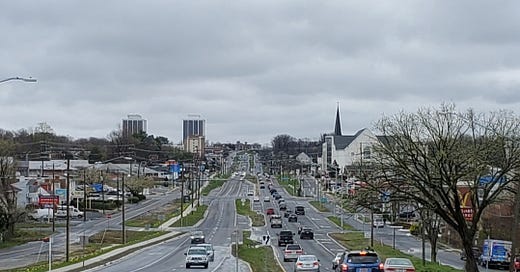I’ve been increasingly bothered by some of the stuff I hear from an arcane contingent of the political right, which identifies itself as “localist” but in reality is closer to feudalist. I wrote about this back in March at The Bulwark:
Conservatives must be wary of allowing localism to become an ideology, in which the most personal needs of unique people and places are abstracted into an idealized vision. If condescending, clichéd “diner journalism” is the elite left’s failure mode when talking about the America “out there,” then an uncritical glorification of such places, an implication that their purpose is cosmic and their accidental residents are bound to their soil, is the failure mode of the right.
Along similar lines, I’ve even heard the notion expressed that immigrants are people of suspect character because they uprooted themselves from their native land and therefore lack a sense of loyalty. This is racist, of course, but it’s also plain moronic. Which brings me to the point of this post.
It’s something of a trope that Northern Virginia isn’t a “real place.” A lot of this is based on the idea that the whole region is just a bedroom community for the federal government and the private contractors. And a lot of it is based on the fact that NoVa leans heavily Democratic and is extremely diverse. There’s both a racial and a political thing going on, whether among some of the area’s older residents or among rural Virginians. For them, foreigners and big government are at issue.
I’ve also heard this trope from some Maryland and D.C. folks, for different reasons. They don’t, of course, object to diversity. In fact, they think of Maryland and D.C. as more diverse and culturally vibrant, and associate NoVa with sprawl, McMansions, and the military-industrial complex. There’s a line to the effect that Maryland is home to the “life sciences corridor” on I-270—biotech and pharma—while Virginia is home to the “death sciences corridor”—the military contractors clustered along a couple of Fairfax County’s main thoroughfares.
I’ve written previously about how Maryland’s D.C. suburbs feel denser and livelier, compared to the more spread out Virginia suburbs. There is something to this latter critique. But I’d say it’s not that simple. Virginia’s D.C. suburbs are in some ways like two distinct places. There are the cavernous, architecturally discordant houses in Great Falls and the luxury car dealers clustered in Tysons Corner. The showy, gaudy affluence derived from this country’s two decades of war in the Middle East, and from the steady growth of government.
But there’s also the Eastern European supermarket in Falls Church. The heavily Ethiopian strip malls in suburban Alexandria. The Latino neighborhood also home to a Peking duck house where presidents dine. The aging strip mall reinvented as a Vietnamese cultural center. The natural beauty of the countryside an hour or so away from D.C. You can take a tour of Mount Vernon and then have Salvadoran food for lunch on Route 1. An old and a new America side by side.
It isn’t just food, of course. It’s a general sense of energy. Northern Virginia (and Maryland and D.C. too) are home to a genuine and unselfconscious diversity. The region’s importance and proximity to the federal government support all of this, but most of it has nothing to do with “the government.” Think of it this way; drive around to the places I alluded to in the previous paragraph, and, without prior knowledge, you’d have no idea this was the federal government’s backyard.
Some folks, I suppose, miss what this region used to be. But it’s not going back, and the vibrancy it now enjoys isn’t “rootlessness” or “placelessness.” It’s a lot of communities, and a lot of places, from all over the world. And, mostly, it works. This region feels rich and real, despite those who think it isn’t—and those who know it is, and don’t like it.
Me? I do like it. And I’m fortunate, and happy, to call it home.




Lately I reject the premise of this. People always treat DC and No. Va as transitory because of the associations with the federal government. I did to a degree when I first moved here.
But the federal government has been around for a good while; it predated the boom of almost every other city or town in this country and it will outlast their bust.
But somehow a vacant oil town in Montana that lasted 2 generations is more "real". Nah, miss me with that. People are dismissive of the DMV because either 1) they are dismissive of the Democrats who spend their entire lives working in and around the federal government to better this country or 2) they are dismissive of the poor and middle class communities (I wonder why people dismiss majority minority DC, hmm) that live and work here as well.
I live in NoVa too and I agree that much of the snobbishness is unwarranted, but it's not like they aren't onto something. When people say "a real place", I think they mean a community with a shared culture and a shared sense of community. I don't think most of NoVa has that.
And it's telling that most of your examples of NoVa being a real place are defined by diversity, not by a shared sense of community. Diversity is fine but it's not enough to make somewhere a "real place", which requires a shared culture and sense of community and fellowship. I'm of Indian stock and quite enmeshed in the Indian community, and most of them feel no connection at all with non-Indian Northern Virginians. Hopefully it will change as more people put down roots here, but diversity is not enough to make somewhere a "real place", in my opinion.